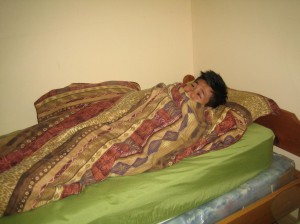Tonsillitis is a condition that develops once the tonsils are inflamed. The tonsils are lymph nodes that are oval in shape that are positioned on either side of the back of the throat. The tonsils work by filtering out any germs that attempt to enter the body via the mouth. Always remember that tonsillitis mainly affects children in between the toddler and adolescent years.
What are the indications?
The main indication of tonsillitis includes reddish, swollen tonsils that are covered with white or yellowish coating. The other indications of tonsillitis include sore throat, headache, ear pain, neck stiffness and fever. Since toddlers usually find it hard to express what they feel, you have to watch out for fatigue, appetite loss, drooling and uncharacteristic fussiness. In addition, young children can also end up with bad breath and scratchy voices.
What are the possible causes?

Tonsillitis is usually triggered by common cold viruses and various types of bacteria, especially Streptococcus pyogenes. The tonsils of the toddler are stressed out while protecting the body against bacteria. Understandably, the overwhelmed tonsils end up inflamed.
Diagnosis
The doctor will inspect the mouth of the toddler to check the tonsils for indications of inflammation and coating. The neck is palpated to feel the lymph nodes for any swelling. The doctor will also take a swab sample at the back of the throat and examine the culture for the presence of bacteria.
Treatment
The pain and fever linked with tonsillitis can be managed with over-the-counter medications such as acetaminophen or ibuprofen. Do not provide the child with aspirin since it has been linked with Reye’s syndrome.
In case tonsillitis is triggered by common cold, it is recommended to simply allow the virus to run its natural course. Doctors generally give antibiotics for tonsillitis that was caused by bacteria. As for toddlers who suffer from recurrent infections, it is oftentimes required to remove the tonsils surgically during a tonsillectomy.
Important considerations to bear in mind
Always ensure that the toddler is given enough time to rest and provided with plenty of fluids to drink while recovering from tonsillitis. Many children can be given a frozen treat such as ice cream or ice pop to suck on for the soothing effect.
You can also utilize a humidifier to moisten the air as well as soothe the sore throat. Since tonsillitis is considered contagious, it is vital to wash hands regularly when caring for a sick toddler.
Once a toddler is suspected with tonsillitis, there are measures that can be provided. On the other hand, if the symptoms become worse or persist, it is best to set an appointment with a doctor for proper assessment and treatment.
